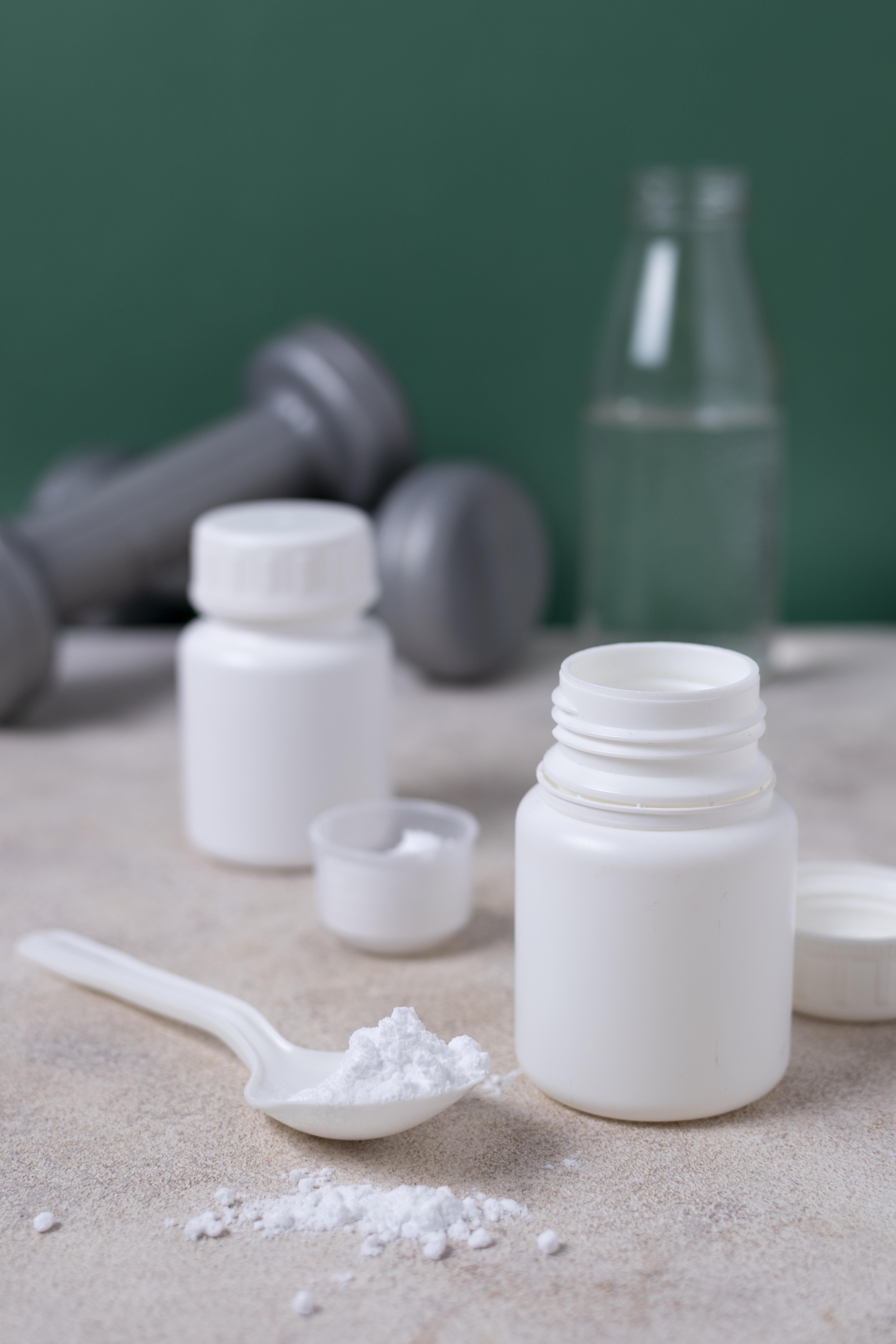When we think of creatine, images of bodybuilders lifting heavy weights often come to mind. But what if we told you that this isn’t just for men or elite athletes? It’s a supplement that offers a range of benefits for women, many of which go beyond building muscle. Whether you’re a runner, a busy professional, or someone looking to boost overall well-being, it might be worth considering.
What Is Creatine?
Creatine is a naturally occurring compound found in small amounts in foods like red meat and fish. It’s also produced by your liver, kidneys, and pancreas. About 95% of the body’s creatine is stored in muscles, with the remaining 5% in the brain, kidneys, and liver.
When you supplement, you’re increasing the amount stored in your muscles. This helps produce more ATP (adenosine triphosphate), the primary energy carrier in cells, allowing for improved performance during short bursts of high-intensity activities like sprinting or weightlifting.
How Can Creatine Help?
Enhanced Muscle Strength and Performance
While this benefit is often associated with men, women can experience similar gains. Studies have shown that creatine supplementation can lead to:
- Increased muscle strength: Women who supplement with creatine often see improvements in strength, particularly in exercises like squats and bench presses.
For instance, A study involving 14 female collegiate soccer players revealed that after 13 weeks of resistance training combined with creatine supplementation, participants experienced an 18% increase in their one-repetition maximum (1rm) bench press and a 24% increase in their 1rm squat. In contrast, the placebo group showed 9% and 12% improvements in bench press and squat, respectively.
- Improved endurance: Short bursts of high-intensity activities, such as sprinting or cycling, can be performed more effectively with creatine supplementation.
- Better recovery: Creatine may reduce muscle damage and inflammation, leading to quicker recovery times between workouts.
Brain Health and Cognitive Function
It isn’t just for muscles—it’s also beneficial for your brain. Research indicates that creatine supplementation can:
- Enhance cognitive performance: Particularly in tasks that require short-term memory and quick thinking. For instance, a systematic review of RCTS involving 281 healthy individuals reported that creatine administration improved short-term memory and intelligence/reasoning abilities.
- Support mental fatigue resistance: Women, especially those who are sleep-deprived or under stress, may find that it helps maintain cognitive function.
- Potential neuroprotective effects: Some studies suggest it could play a role in protecting against neurological diseases, though more research is needed.
Bone Health
Emerging research suggests that creatine may have a positive impact on bone health. While the primary focus has been on muscle mass, there’s evidence to indicate that:
- Increased muscle strength can lead to better bone density: Stronger muscles place more stress on bones, which can stimulate bone formation.
- Creatine supplementation, combined with resistance training, may enhance bone mineral density. This is particularly important for women, who are at higher risk for osteoporosis as they age.
Hormonal Balance
Creatine may influence hormones in ways that benefit women:
- Supports estrogen levels: Some studies suggest supplementation can help maintain healthy estrogen levels, which is crucial for reproductive health.
- May aid in menstrual cycle regulation: While more research is needed, there’s potential for creatine to support hormonal balance during the menstrual cycle.
Mood and Mental Health
Mental well-being is just as important as physical health, and it might play a role here, too:
- Potential antidepressant effects: Some studies have found that creatine supplementation can have antidepressant-like effects, particularly in women with major depressive disorder. For example, a notable study published in the American Journal of Psychiatry in 2012 involved 52 women aged 19 to 65 years diagnosed with MDD. Participants were randomly assigned to receive either 5 g/day of creatine monohydrate or a placebo, in addition to escitalopram (a selective serotonin reuptake inhibitor). The primary measure of efficacy was the Hamilton Depression Rating Scale (HAM-D).
- Improved mood and reduced anxiety: While more research is needed, there’s evidence to suggest creatine may help alleviate symptoms of anxiety and depression.
Pregnancy and Postpartum Health
During pregnancy and the postpartum period, women’s bodies undergo significant changes. Creatine supplementation may offer benefits such as:
- Support for fetal brain development: Creatine is involved in energy metabolism, which is crucial for developing fetal tissues.
- Aid in postpartum recovery: Creatine may help in muscle recovery after childbirth, especially for women who experience muscle weakness.
However, it’s essential to consult with a healthcare provider before starting any supplementation during pregnancy or breastfeeding.
Skin Health
While not a primary benefit, creatine may have positive effects on skin health:
- Improved skin hydration: Some studies suggest creatine can enhance skin hydration, leading to a more youthful appearance.
- Potential anti-ageing effects: By supporting cellular energy production, creatine may help reduce the appearance of fine lines and wrinkles.
How to Take Creatine
If you’re considering adding creatine to your routine, here’s how to do it safely:
- Dosage: A common regimen involves a “loading phase” of 20 grams per day (divided into 4 doses) for 5–7 days, followed by a “maintenance phase” of 3–5 grams per day. Alternatively, you can skip the loading phase and take 3–5 grams daily.
- Timing: Creatine can be taken at any time of day, but taking it post-workout with a carbohydrate-rich meal may enhance absorption.
- Form: Creatine monohydrate is the most researched and cost-effective form. Micronised creatine is another option, which may be easier on the stomach.
Potential Side Effects
Creatine is generally safe for most people when taken as directed. However, some individuals may experience:
- Water retention: Creatine draws water into muscles, which can lead to temporary weight gain. For instance, a study published in the Journal of Strength and Conditioning Research found that creatine supplementation increased total body water by approximately 1.5 litres over 7 days. This increase was primarily due to water retention within muscle cells.
- Digestive issues: Some people may experience bloating or stomach discomfort.
- Kidney concerns: Those with pre-existing kidney conditions should consult a healthcare provider before using creatine.
Life After Creatine: Real People on the Benefits of Creatin
An Absolute Game-Changer
In his forties, a Reddit User says that he revisited creatine after not noticing much impact from it in his younger years—and this time, the effects were significant. He reported a noticeable boost in overall well-being, describing it as a younger, stronger kind of feeling, with a possible edge in mental sharpness as well. His performance in the gym improved, with more reps coming easier, aligning with what studies have shown. He also noted some water retention, a known side effect of creatine supplementation.
Holistic Benefits
A Reddit User is taking 5–6g of creatine daily and is considering a one-week loading phase at 20g/day. She highlights creatine’s well-documented benefits, including improved physical performance, increases in lean muscle mass, and potential cognitive enhancements. Subjectively, she has noticed their muscles feeling denser and firmer and has experienced occasional improvements in mental clarity. Based on her experience and existing research, she recommends creatine supplementation, especially for individuals engaged in resistance training or anaerobic cardio.
30-Day Creatine Results
You can also check out this amazing video by YouTuber Nourishmovelove on her 30-day results with creatine.
Know Your Creatine
Creatine is more than just a supplement for muscle gain. For women, it offers a range of benefits—from enhanced cognitive function and mood support to improved bone health and skin hydration. As with any supplement, it’s essential to consult with a healthcare provider to determine if creatine is right for you.
Remember, a balanced diet, regular exercise, and adequate sleep are the cornerstones of good health. Supplements like creatine can be a helpful addition, but they shouldn’t replace healthy lifestyle choices.
If you’re interested in trying creatine, start with a reputable brand and follow the recommended dosage. Monitor how your body responds and adjust as needed. With the right approach, creatine can be a valuable tool in supporting your overall health and well-being.









Leave a Reply